- Home
- Dot Hutchison
The Roses of May (The Collector Trilogy Book 2)
The Roses of May (The Collector Trilogy Book 2) Read online
ALSO BY DOT HUTCHISON
A Wounded Name
The Butterfly Garden
This is a work of fiction. Names, characters, organizations, places, events, and incidents are either products of the author’s imagination or are used fictitiously. Any resemblance to actual persons, living or dead, or actual events is purely coincidental.
Text copyright © 2017 by Dot Hutchison
All rights reserved.
No part of this book may be reproduced, or stored in a retrieval system, or transmitted in any form or by any means, electronic, mechanical, photocopying, recording, or otherwise, without express written permission of the publisher.
Published by Thomas & Mercer, Seattle.
www.apub.com
Amazon, the Amazon logo, and Thomas & Mercer are trademarks of Amazon.com, Inc., or its affiliates.
ISBN-13: 9781503939509
ISBN-10: 1503939502
Cover design by Jae Song
To the dangerous girls with sharp-edged smiles
CONTENTS
START READING
FEBRUARY
Paperwork will, if . . .
MARCH
The temperature isn’t . . .
APRIL
Geoffrey MacIntosh lives . . .
MAY
Mum leaves to . . .
ACKNOWLEDGMENTS
ABOUT THE AUTHOR
Her name is Darla Jean Carmichael, and she’s your first.
But then, you don’t know that yet.
What you know, on this fine spring day, is that it seems even God himself has gone out of his way to make her look more beautiful. She’s all innocent beauty, no artifice or vanity; it’s why you love her the way you do. Her shining blonde hair hangs down her back in heavy waves and she’s wearing her old-fashioned white Easter dress again, even has the lace gloves and starched lace hat on. Have you ever seen anything so wholesome? So pure?
Even nature agrees with you today. Along either side of the bare, dusty path to the church, the grass is thick with jonquils, all yellow and white, like they could never aim higher than to match Darla Jean. Even the wild daisies are yellow and white, and most years they’re ribbons of pale lavender through the fields.
This year there’s only Darla Jean.
Except . . . not just Darla Jean.
Her hand is looped through the arm of a young man, tucked into the crook of his elbow like it belongs there, and it doesn’t. Her hand doesn’t belong there because he isn’t you. Darla Jean is yours.
Has always been yours.
She’s never needed you to tell her before; she’s always just known it, the way she should, because the two of you are meant to be together, whatever others would say if they knew.
Furious, heartbroken, you follow them to the small brick church, set against such an explosion of flowering trees it looks like a needlepoint. Somehow, despite the rush of emotions pounding in your ears as another heartbeat, you notice other things. In his free hand, the young man carries the basket of treats her mother asked her to take to the church, each individually wrapped for sale because the church needs a new roof before storm season.
He leans into her every time she laughs.
She’s laughing a lot.
But that sound is yours, just like the rest of her is yours, and how could she share it with someone else? That laugh has always soothed you, teased you away from the rage that stays far too close to the surface. Now each time you hear it—high and soft, like the wind chimes on the back porch—you feel a sharp pain in your chest, a throbbing echo in your skull.
They walk together into the church, and it takes you a minute or two to find a window that lets you see them clearly, without being seen in turn. She shouldn’t have to know you’re there to know what she owes you, how she ought to behave. The interior of the church is dim, full of shadows and starbursts after the bright sunlight, so you don’t immediately realize what’s happening.
And then you do.
All you see is blood.
He’s kissing her, or she’s kissing him, faces tilted toward each other’s, the rest of them nearly a foot apart. It might be his first kiss.
You know it’s hers.
The first kiss that was supposed to be yours—that you’ve been waiting for all these years. But you’ve cherished her instead, knowing she’s too pure, too innocent to be sullied with such things.
She was too pure. Was too innocent.
You slide down the outer wall of the church, the bricks rough and painful, scraping and digging through your clothing. You’re shaking—you might be weeping. How could she? How could she do this to herself, to you?
How could she let herself be tarnished?
She’s worthless now, just like all those other whores out in the world, always flaunting their bodies and their smiles and their cruel, knowing eyes. You would have worshipped her to the end of your days.
You love her, though. How could you not, even still? You love her enough to save her, even if you have to save her from herself.
You hear the boy leave, an apology tumbling from his lips—he has to help his brothers get ready. You hear the pastor greet Darla Jean with good cheer. He tells her he has to run into town to buy cups for the lemonade—will she be all right alone? But of course she will. She’s grown up in this church. It’s never been anything but a safe place. She can’t imagine a world where that won’t always be true. As you watch the pastor walk down the path—away, and farther yet—you hear her start to sing.
Her songs are yours, too, and there’s no one else to hear them now.
She greets you with a smile and a laugh when you walk inside, her eyes bright. You can’t call them guileless. Not anymore. Not now that she’s lost her innocence. Her smile falters as you approach.
She has the nerve to ask you what’s wrong.
You know you don’t have much time—it’s less than two miles to town, and the pastor walks there and back frequently—but there’s time enough to show her. You show her everything.
You promised her a life together, that you would always be there for her. You promised her the world.
She threw it away.
This is all her fault.
You leave at a run, still seething with hurt and betrayal.
Darla Jean stays behind, sprawled on the stone, her Easter dress just tatters and rags soaking up the pool of red. The jonquils you’d picked for her—a gift, and look what she’s done with it—lie scattered around her. Her eyes are wide and empty, an echo of confusion, and you’ve given her a jagged smile she can share with the world if she wants to.
She can’t laugh anymore, can’t sing, can’t taint what’s yours.
She can’t do anything anymore. Perhaps you didn’t mean to. Perhaps your hunting knife slipped and cut too deep. Perhaps you forgot there’s so much blood so close to the surface. Perhaps you did exactly as you meant to.
She’s just another whore, after all.
Now Darla Jean is dead.
You didn’t know she’d be your first.
You don’t know yet, but she won’t be your last, either.
FEBRUARY
Paperwork will, if left unattended, multiply exponentially, much like rabbits and wire coat hangers. Scowling at the newest stacks on his desk, Special Agent Brandon Eddison can’t help but wonder how they would look on fire. It wouldn’t take much. Just a flick of a match, the snick of a lighter, the corners of one or two pages in the middle so it would catch nice and evenly, and then all the papers would be gone.
“If you set them on fire, they’ll just print them off again and you’ll have all of it plus the paperwork about the
fire,” says a laughing voice to his right.
“Shut up, Ramirez,” he sighs.
Mercedes Ramirez—his teammate and friend—just laughs again and leans back in her chair, stretching into a long, slightly curved line. Her chair creaks in protest. Her own desk is covered in papers. Not stacks. Just covered. If he asks her for any specific piece of information, she’ll find it in under a minute, and he will never understand how.
In the corner, facing their angled desks, is the lair of their senior partner, Supervisory Special Agent in Charge Victor Hanoverian. To Eddison’s disgust and amazement, all the paperwork on that desk seems to be done, sorted into colored folders. As the leader of their intrepid trio, Vic has more paperwork than either of them, and he always has it finished first. Thirty years in the Bureau does that to a person, Eddison supposes, but it’s a terrifying thought.
He looks back at his own desk, at the newest stack, and grumbles as he reaches for the top pages. He has a system, one that baffles Ramirez as much as hers unnerves him, and despite the height of the pile, it doesn’t take him long to move the papers to the appropriate columns at the back of his desk, sorted by both topic and priority. They align neatly with the back edge and corners of the surface, alternating portrait and landscape within each stack.
“Has a nice doctor ever talked to you about that?” asks Ramirez.
“Has A&E ever staged an intervention about yours?”
She snickers and turns back to her desk. It would be nice if, just once in a while, she rose to the bait. She’s by no means unflappable, but she’s strangely impervious to teasing.
“Where is Vic, anyway?”
“On his way back from a deposition; Bliss asked for him to be there.”
He wonders if he should point out that, three and a half months after they rescued the surviving girls from the burning Garden, she’s still using the Butterfly names, the names the victims were given by their captor.
He doesn’t point it out. She probably knows. The job is easier, most of the time, if they can put everything in neat little boxes in their minds, and who the girls were before they were taken is harder to integrate.
He needs to get to work. It’s a paperwork day, or mostly, and he really should make at least one of those piles disappear by the end of the day. His eye falls on the colorful tower of folders that lives on the back-right corner of his desk, growing over the years with more folders but no answers. That stack never disappears.
He leans back in his chair and studies the two framed photos atop the squat filing cabinet that holds his office supplies and blank forms. One is of him and his sister on a long ago Halloween, one of the last times he saw her before she got snatched off the street on the way home from school. She was only eight years old. Logic tells him she must be dead. It’s been twenty years, but he still finds himself examining any twenty-something woman who resembles her. Hope is a strange and fickle thing.
But then, so was Faith, strange and fickle, back when she was just his sister rather than a missing-child statistic.
The other photo is newer, just a couple of years old, a souvenir from the most disturbing and unexpected day trip he’s been on that didn’t involve work. Priya and her mother dragged him on a number of strange sightseeing trips during the six or so months they lived in D.C., but that jaunt was the stuff of nightmares. He’s not even sure how they ended up in a field full of massive presidential busts. They did, though, and at one point Eddison and Priya had climbed up onto Lincoln’s shoulders, both pointing to the very large hole in the back of the statue’s head. Realistic? Yes. Intentional? Judging from the battered condition of the rest of the twenty-foot-tall busts . . . no, not so much. There are other pictures from that day—safely tucked away in the shoe box in the crawl space in his closet—but this is his favorite. Not because of the thoroughly discomfiting bust of an assassinated president, but because it’s the one where Priya surprised herself by grinning.
He’s never known the Priya who grinned without thinking. That Priya shattered just days before he met the girl who grew from those broken pieces. The Priya he knows is all sharp edges and snarls and smiles that slap you in the face like a challenge. Anything softer—anything kinder—is accidental. Her mother may see some of that softness still, but no one else does, not since Priya’s sister was reduced to photos and facts in one of the colored folders on the back corner of his desk.
Eddison is fairly sure he would never have become friends with the old Priya. He’s still startled to be friends with this one. She should have only ever been the sister of a murder victim, a girl to interview and feel sorry for and never really know, but in the days after her sister’s murder, Priya was so damn angry. At the killer, at her sister, at the police, at the whole fucking world. Eddison is very familiar with that kind of anger.
And because he’s thinking about her, because it’s a paperwork day after a string of bad days fighting to contain the media on the Butterfly case, he pulls out his personal cell, snaps a picture of the framed photo, and texts it to her. He doesn’t expect a response—the clock tells him it’s only nine where she is, and without school to wake her up, she’s probably still burrowed in her blanket burrito.
A moment later, though, his phone buzzes with a reply. The photo is a long shot of a red-brick building that should be stately but just looks pretentious, one stretch of brick covered by rusting iron lattices that probably hold ivy in the warmer months. Tall, medieval-looking narrow windows are scattered through the brick.
What the hell?
His phone buzzes again. This is the school I almost got stuck going to. You should see their uniforms.
I knew you were only doing online classes so you could stay in pajamas all day.
Well, not ONLY. You know the headmaster protested when Mum told him we wouldn’t be enrolling? Told her she was doing me a disservice by allowing me to slide by with an inferior education.
He winces. I can’t imagine that went well.
I guess he’s used to flexing his dick and getting what he wants. Mum’s dick is more impressive.
A weight drops onto his shoulders and he flinches, but it’s just Ramirez. Her concept of personal space is drastically different from his, in that he actually has a concept of what it should be. Rather than argue, because it never seems to do any good, he tilts the screen so she can read it.
“Flex his . . . Eddison!” She flicks his ear hard enough to hurt. “Did you teach her that?”
“She’s almost seventeen, Ramirez. She’s perfectly capable of being crass all on her own.”
“You’re a bad influence.”
“What if she’s the bad influence?”
“Who’s the adult?”
“Certainly neither of you,” observes a new voice.
They both cringe.
But Vic doesn’t remind them that personal cells aren’t supposed to be out during work hours, or that they have things they really should be doing. He just walks past them, the smell of fresh coffee wreathing around him, and calls back over his shoulder, “Tell Priya hello.”
Eddison dutifully taps it in as Ramirez slinks back to her desk. He laughs at Priya’s instant response. Awww, did you get detention?
What are you doing awake, anyway?
Wandering around. The weather finally turned.
Isn’t it cold?
Yes, but it is no longer snowing, slushing, or otherwise shitting cold wet things from the sky. Just seeing what’s here.
Call me later. Tell me what’s there.
He waits for her affirmative, then slips the phone back into the drawer with his gun and badge and all the other things he’s not supposed to play with when he’s at his desk. In the damn-near unrelenting slog of horrors that is his job, Priya is a prickly spark of life.
He’s been in the Bureau just long enough to be grateful for that.
Huntington, Colorado, in February is freaking freezing. Even layered up enough to feel three times my size, the cold has a way of creeping be
tween fabrics. We’ve been here a week, and this is the first day it’s been almost nice enough to explore.
So far, it all feels very much like any of the places we’ve lived in the past four years. Mum’s company shuffles us all over the country so she can put out fires, and in three months we’ll be leaving again, maybe even for good, so she can take over Human Resources in the Paris branch. Not that France is necessarily final, but I think we’re both hoping it will be. Priya in Paris has a lovely sound. In the meantime, Huntington is close enough to Denver for Mum to sensibly commute, far enough that it’s supposed to feel more like a community than a city, according to the company agent who let us into the house our first day.
After five days of slushing, it snowed over the weekend, leaving the lawns fluffy and white and the borders nasty and grey. There is very little uglier than plowed snow. The roads are clear, though, and all the sidewalks are tinted blue from the salt. It feels like walking over the remnants of a Smurf slaughter.
I shove my hands into my coat pockets as I walk, partly for warmth on top of the gloves, partly to keep my fingers from itching for a better camera than my phone’s. I left my good camera at the house, but Huntington is a little more interesting than I expected it to be.
Passing the closest elementary school reveals a squirrel winter home set up to one side of the playground; it’s basically a high-stilted chicken coop painted bright red. There’s a hole in the bottom so the squirrels can get in and out, and the blinking red light of a camera inside that must let kids in the school keep an eye on the rodents through the winter. Currently, a few are sleeping peacefully on what look to be semi-shredded quilts and sawdust. Yes, I totally peeked. It’s a squirrel home.
A mile or so on, there’s a bare space set back from one corner of an intersection, too small to be a park of any kind, but with a gorgeous wrought-iron gazebo in the middle of it. Sort of a gazebo—it doesn’t have a floor, just the posts digging down into frozen earth, but for all the strength of the metal, the supports are intricately wound together and the almost onion-top looks lacy and delicate. Like an outdoor wedding chapel, but surrounded by fast food joints and a stand-alone optometrist’s office.

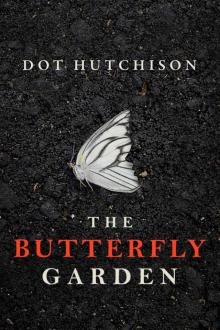 The Butterfly Garden
The Butterfly Garden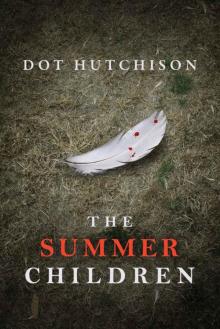 The Summer Children (The Collector Series Book 3)
The Summer Children (The Collector Series Book 3) A Wounded Name (Fiction - Young Adult)
A Wounded Name (Fiction - Young Adult)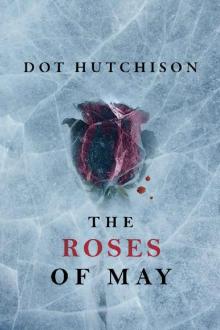 The Roses of May
The Roses of May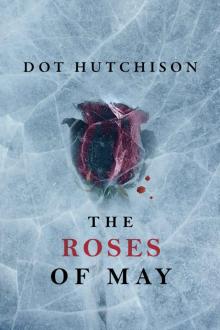 The Roses of May (The Collector Trilogy Book 2)
The Roses of May (The Collector Trilogy Book 2)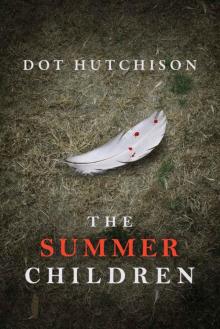 The Summer Children
The Summer Children